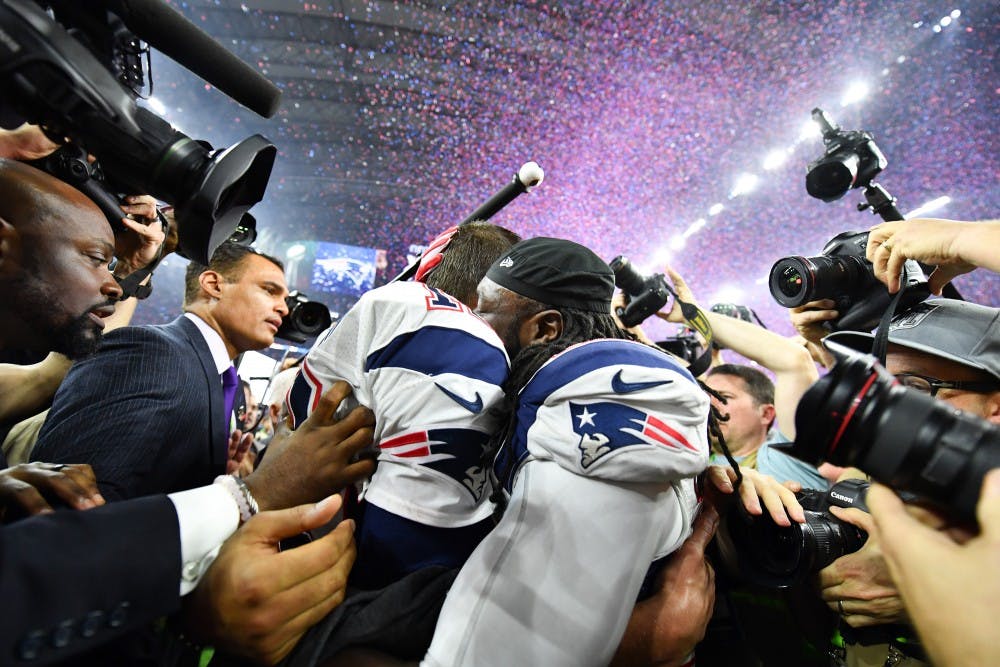You walk into the most famous house in the country. The President of the United States honors you and your team. You get to shake the leader of the free world’s hand.
This is an honor that most people can only dream of, but this year it is an honor that some of the Super Bowl LI champion players are boycotting.
In this unusual first 100 days of Donald Trump's presidency, the New England Patriots players' decision to boycott the White House represents a large population in the United States, including the ASU community, who have also protested the election of Trump.
Even before the New England Patriots won the Super Bowl, tight end Martellus Bennett said if they won, he would not attend. Bennett said his reasoning was simply, “I don’t support the guy in the (White) House."
Since then, several other players have followed Bennett’s steps, and two players are still deciding whether they will attend the White House.
“It’s not unusual, it’s not improper, they have their right,” said David Williams, a sociology professor at ASU. “It’s just surprising.”
While Dont’a Hightower didn’t cite Trump as his reason for not attending, the other players did in very interesting ways.
"I will not be going to the White House,” LeGarrette Blount told the Rich Eisen Show. “I don't feel welcome in that house. I'll leave it at that."
While Williams said he finds it surprising that these players are boycotting because many athletes in his experience are conservative, it appears that the athletes’ boycott goes deeper than just party lines.
One reason some of these players may not feel accepted in the White House is because of the president’s racist comments during the campaign.
"(The) basic reason for me is I don't feel accepted in the White House,” Devin McCourty told Time magazine. “With the president having so many strong opinions and prejudices I believe certain people might feel accepted there while others won't."
What these football players are boycotting is representative of the hundreds of protests with millions of people since Donald Trump was elected president, including a handful on the ASU campuses.
“Remember, even though Trump won’t admit it, that three and a half million more people voted for Hillary Clinton than voted for Trump,” Williams said.
While ASU is located in a traditionally conservative state, it still found itself in the middle of many situations that are symbolic of what these athletes are boycotting right now.
ASU students and faculty have already protested Trump many times. Protests have been conducted by students and faculty about Trump’s travel ban, and in a Tempe march, local residents made their way over the ASU bridge holding signs saying “#WeAreAllAmerica” and “Love for all.” There was even a protest on the ASU Tempe campus the night after the election.
Not too long after Trump was elected, nearly 1,200 students and facility members at public universities and community colleges across Arizona signed a letter asking for the protection DACA students. ASU president Michael Crow made sure that the people in the University knew that it would stand up for it’s DACA students if Trump repealed the law as he sent a letter to all students and facility at ASU.
Following racial tensions at ASU, Barrett, the Honors College, professor Mathew Sandoval posted signs all around his classroom in the University center attempting to promote unity in the area.
“Dear Muslim students,” one of the signs said. “You are not ‘terrorists’ or people to be feared. You are integral to our intellectual community.”
The others signs followed the same style addressing groups attacked during Trump’s campaign, preceded by a reassuring message against Trump’s rhetoric and with all of them ending the same way.
This large group of local citizens, students and faculty at ASU are the ones being represented by the much better known athletes.
This isn’t the first time some players have declined a visit to the White House after winning a major sports championship. Just two years ago, Tom Brady didn’t visit the White House when Barack Obama was president.
However, this time is much different. While in the past maybe one or two people from the team would decline to go and usually it would be because of a “scheduling conflict,” this year it is a clear message to the president.
These athletes are using their platform and voices to show their disapproval with the results of the most recent election, something they’re absolutely allowed to do. Their actions are representative of a large community and the president’s already very low approval rating in only his first 100 days.
“If I were invited (to the White House), I would not go,” Williams said. “Because. Just because.”
Reach the columnist at kmarlin1@asu.edu or follow @kynan_marlin on Twitter.
Editor’s note: The opinions presented in this column are the author’s and do not imply any endorsement from The State Press or its editors.
Want to join the conversation? Send an email to opiniondesk.statepress@gmail.com. Keep letters under 500 words and be sure to include your university affiliation. Anonymity will not be granted.
Like The State Press on Facebook and follow @statepress on Twitter.




